

Teaching Kids to Move Beyond One-Word Questions. “Does anyone have any questions?”
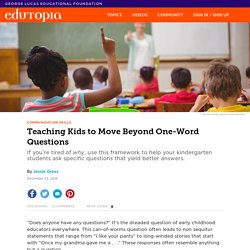
It’s the dreaded question of early childhood educators everywhere. This can-of-worms question often leads to non sequitur statements that range from “I like your pants” to long-winded stories that start with “Once my grandma gave me a . . .” These responses often resemble anything but a question. To avoid these tangents, teachers can turn the question “Does anyone have any questions?” How Are Kindergarten Teachers Balancing More Rigorous Standards? Education experts widely recognize that a strong early childhood education is an important factor to set kids up for success in school.
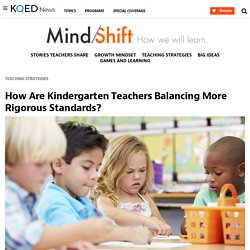
But whether kindergarten is more like preschool or elementary school has long been an open question that leaves teachers caught in-between. For some children kindergarten is the first time they’ve been to school, and at five-years-old they’re still too young to shoulder the anxiety and pressure of benchmark testing. Tips and tricks for kindergarten teachers lesson plan ideas. You join a special club when you become a kindergarten teacher.
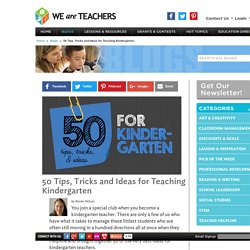
There are only a few of us who have what it takes to manage these littlest students who are often still moving in a hundred directions all at once when they arrive in our classrooms. We’ve scoured our WeAreTeachers Helpline and brought together 50 of the very best ideas for kindergarten teachers. 1. Start at the very beginning. “Don't assume they know how to do anything. 2. “Be ready for kids who are readers, kids who have never seen letters, and everything in between. 3. Low maintenance, high fun! 4. Kindergartens Ringing the Bell for Play Inside the Classroom. Keeping Play in Kindergarten. After two rewarding years of teaching pre-K, I felt ready for the new challenge of teaching kindergarten.
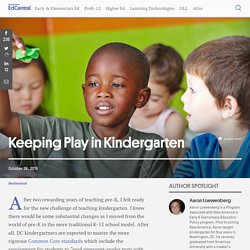
I knew there would be some substantial changes as I moved from the world of pre-K to the more traditional K-12 school model. After all, DC kindergartners are expected to master the more rigorous Common Core standards which include the requirement for students to “read emergent-reader texts with purpose and understanding.” Nap time was gone and lesson planning would soon consume a large portion of my weekends. The Poem Farm. FUN Critical Thinking Activities.
For Students in Any Subject The experts on STAAR, such as the Texas Education Agency, the Lead4Ward team and Regional Service Centers tell us that there are some very specific things that we need to do, and other things we should let go of in order to prepare our students for the state assessment.
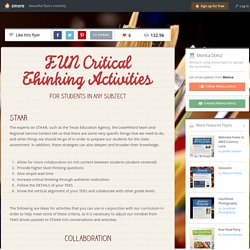
In addition, these strategies can also deepen and broaden their knowledge. Allow for more collaboration on rich content between students (student-centered)Provide higher level thinking questionsGive ample wait timeIncrease critical thinking through authentic instructionFollow the DETAILS of your TEKSKnow the vertical alignment of your TEKS and collaborate with other grade levels The following are ideas for activities that you can use in conjunction with our curriculum in order to help meet some of these criteria, as it is necessary to adjust our mindset from TAKS driven packets to STAAR rich conversations and activities. Talking Chips 1. K-3 Links. All About Balanced Literacy. Shared Reading is a link in helping students become independent readers.
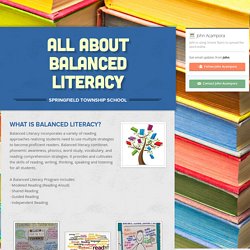
It allows the teacher to model and support students using prediction and confirming skills. It allows less confident students the chance to share stories/articles/poetry in a nonthreatening situation. It focuses on the meaning, fun, enjoyment, characters and sequence of a story and allows them to relate it back to their own experiences. It promotes discussion, problem solving and critical thinking by students. Independent Reading: 101. What is Independent Reading, Really?
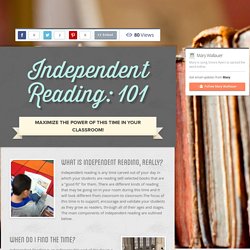
Independent reading is any time carved out of your day in which your students are reading self-selected books that are a "good fit" for them. There are different kinds of reading that may be going on in your room during this time and it will look different from classroom to classroom.The focus of this time is to support, encourage and validate your students as they grow as readers, through all of their ages and stages. Teaching With a Mountain View: Anchor Chart Tips & Tricks. It's no secret that I have a "thing" for anchor charts.
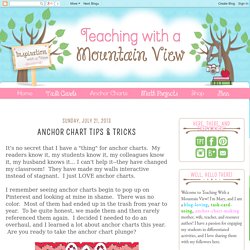
My readers know it, my students know it, my colleagues know it, my husband knows it... I can't help it--they have changed my classroom! They have made my walls interactive instead of stagnant. I just LOVE anchor charts. I remember seeing anchor charts begin to pop up on Pinterest and looking at mine in shame. Mrs. Lockett's Kindergarten Math Pinterest page. Mrs. Wills Kindergarten: 10 Questions Answered-Math Workshop. I am going to try to answer some of the questions we have gotten on our Math Workshop units. 1.
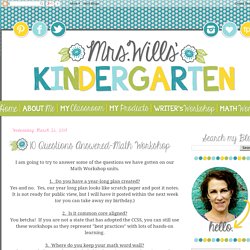
Do you have a year-long plan created? Yes and no. Yes, our year long plan looks like scratch paper and post it notes. It is not ready for public view, but I will have it posted within the next week (or you can take away my birthday.) 2. You betcha! 3. These vocabulary cards are included in the unit. 4. Ms Ugolini's Kindergarten Class: Math. Hello Families, To reinforce what they have learned about two-dimensional shapes in class, try this activity with your child: Imagine that your backs are drawing boards.
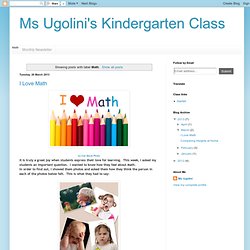
Take turns using a finger to draw shapes on each other's backs. Try to guess the shape that the other person is drawing. A Differentiated Kindergarten: Math Stations Tips (and a Freebie) Linky Party. Math Stations! So fun and, yet somehow, so hard to wrap your head around. . . A Differentiated Kindergarten: Daily 5 2nd Edition Chapters 5 and 6 or "Make it your own and make it work! KINDERWORLD: Educational YOUTUBE Videos. I am constantly searching the web and Youtube for new educational videos.
The Wonderful World of Kindergarten. Chalk Talk: A Kindergarten Blog: daily math routines. I recently read an article about calendar time for young children. It was first published in the May 2008 issue of Young Child (an NAEYC publication). You can read the article in its entirety here. The article made me think of my own calendar experiences and how maybe it was time to rethink some of the calendar routines that I had used for so many years. Calendar time/math circle time on the carpet can be a very important part of your day or it can be a dreary and difficult time to manage. It all depends on what you do and how you do it.
A Class of Six Year Olds Inviting the World into Their Classroom. Focus On Play In Kindergarten May Improve Grades Later On, Study Says. BY KATHRYN DOYLE Fri Nov 14, 2014 10:09am EST (Reuters Health) - Training teachers to promote structured play among kindergarteners yields improved reading, vocabulary and math scores that persist into first grade, according to a new study. The technique, called ‘Tools for the Mind,’ seemed to be particularly effective in high-poverty schools, the authors write. “The active ingredient is children are taking responsibility for their own learning,” said Clancy Blair of the Steinhardt School of Culture, Education, and Human Development at New York University, who led the study. The Importance of Block Play - Journey Into Early Childhood. A journey through inquiry-based play. Investigating Choice Time: Inquiry, Exploration, and Play.
Have you ever had a parent ask you if her/his child is ready for kindergarten? Have you ever heard a teacher complain about a child who doesn’t have enough academic skills to be in kindergarten? I’ve been wondering a lot about these two questions. Checking online, I found one after the other websites-advising parents about kindergarten readiness. Some sites discuss the pros and cons of redshirting, keeping a child back from kindergarten so as to give (usually) him an extra ‘edge’ in the grade and also giving him time to develop the ability to sit still for extended periods – time for hours of reading, writing, phonics and math.
My big question is this: Shouldn’t kindergarten be ready for all children? Shouldn’t teachers (and administrators, of course) understand that within this kindergarten age group there’s a wide range of development, physically, socially and intellectually? Why not introduce an inquiry into the names of classmates? TeamJelleybean: Recycling in Kindergarten. Mrs. Ricca's Kindergarten: Reading Workshop Ideas & Freebies. Wow...March has been a busy month! As a student at TC, I've had the opportunity to attend all of the workshops offered by the Reading and Writing Project for free (though if you account for the insane tuition, I wouldn't exactly call it free)! The staff developers - Lucy Calkins, Kathy Collins, Rebecca Cronin, Amanda Hartman, Natalie Louis, Christine Holley - are ALL absolutely fabulous and I'm learning so much from them.
I feel so lucky to be learning directly from the masters themselves! Below are just a few of the ideas I've gotten from their workshops. Readers_workshop_in_a_kindergarten_classroom.pdf. CalkCurricPlan GrK ReadWshp. Word Study Instruction in the K-2 Classroom. Click the "References" link above to hide these references. Bear, D.R., Invernizzi, M., Templeton, S., & Johnston, F. (2000).